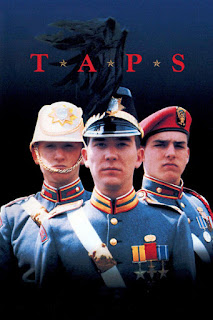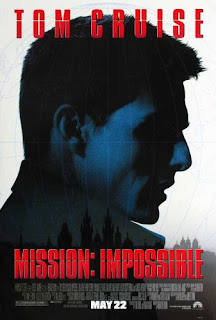Top Gun (1986)
I was concerned about rewatching Top Gun because, in truth, I'm not sure what I can say that hasn't already been said about it. After all, Top Gun is the most quintessentially 80s movie to exist. It has it all: mindless action, blatant US military propaganda, forced romantic subplots, cheesy synths, Berlin and Kenny Loggins, homoerotic subtext, and, of course, Tom Cruise. Of course, there's something interesting to be said when the film is put into the context of the 80s and of Cruise's life and career.
After the failure of his previous film Legend (directed by Ridley Scott, brother of Todd Scott, the director of this movie), Cruise seemed doomed to obscurity just as quickly as his fame came to him. It's truly a testament to the commercial environment of the 80s that Top Gun proved to be enough of a hit that it officially launched Cruise to his superstar status, a status of such gargantuan proportion that he's often called the last movie star. And "movie star" is a very apt description in this instance, because Top Gun really doesn't provide anything of substance. It's unapologetically a recruitment tool for the US Navy, so much so that the Maverick's character conflict is resolved by simply embracing how cool he looks when he flies planes for the Navy (a tactic that worked well enough, given a 500% increase in Navy recruits following the release of Top Gun).
There's nothing cinematically special about Top Gun. Admittedly, the first time I watched it, I was quite bored by it; it feels so much like dozens of other action feels I've seen that I could hardly care about any part of it. But with each rewatch, I find something new that interests me more than the last time. Obviously, there's the sexual tension between Ice Man and Maverick, something that's so thick and in-your-face that part of me wonders if it was at least somewhat intentional. This time around, I was particularly struck by the scene early on in the film in the bar, where Goose turns to Maverick to make a bet and tells him that he has to "have carnal knowledge, of a lady this time, on the premises." The implications from this one statement are staggering and the film never addresses it again.
Then again, the movie is a disjointed string of various simplistic concepts, which seems to be a result of a somewhat chaotic production. As the story goes, Cruise was allegedly hesitant to sign onto this film. By the time he was approached, a number of well-known actors had already passed on the role, with a large amount of them citing objections to the pro-military sentiments of the script. Some sources, such as Andrew Morton's biography on Cruise, claim that he finally joined the film after receiving some control over production and rewrites of the script; others also mention that Cruise's first experience with flying a jet truly sealed the deal. Reportedly, Cruise suggested the film feature more scenes such as the locker room scenes, a suggestion which contradicted the desires of the Navy consultants' wishes for the film to be an accurate representation of TOPGUN, but ultimately won out.
Although Cruise never received any kind of formal education with regard to his acting, he continued his trend of throwing himself into the role in his version of method acting. As a result, he mostly isolated himself to stay in character while behind-the-scenes drama continued between producers. Even in post-production, issues emerged: after a test screening, Kelly McGillis and Cruise were pulled away from the sets of their next movies to quickly film the awkwardly hilarious sex scene, which most likely explains the complete lack of chemistry between the two.
The result is a movie that is both unengaging and bizarrely full of rabbit holes to explore. It's a movie oozing with hypermasculinity and US patriotism and just as overt homoeroticism sizzling right underneath. It's so predictable and engrossed in his own grandiosity that, sometimes, I'm convinced that it's nearly a camp classic. But even more interesting is the way that Top Gun reflects on Cruise's career. For instance, there's the fact that this is the first time Cruise played a military man (excluding the cadet he played in Taps), and also the first time that his character is mentioned to have some daddy issues. In real life, Cruise's father died a year before filming. Many times, Cruise has mentioned that his father was an incredibly abusive man who regularly beat him as a child until his mother left him in a dramatic middle-of-the-night escape when Cruise was 12 years old. He remained estranged from his father until 1984, when, during the filming of Legend, Cruise was informed that his father was on his death bed. His father died before they could discuss anything in depth. Afterwards, there's a noticeable uptick in roles that Cruise chooses where his character has obvious issues with his father, usually centered around abandonment.
Most importantly, however, is the way that Top Gun created a new mythos around Tom Cruise. Gone were the days of Joel Goodsen; now, Cruise was larger-than-life, a cocky hot-shot with the world at his feet and the ghost of a father he never fully understood weighing on his shoulders. Cruise always had a reputation of being ambitious and somewhat arrogant, but now he had a successful role that he could mirror to find even further success. He was now famous enough to draw the attention of the Celebrity Center run by the Church of Scientology, whose influence only served to boost Cruise's confidence and ego to a level that seems completely insane nowadays.
There's something a bit comedic about how a film so plain resulted in such a drastic reshaping of stardom and celebrity by simply inventing a new concept of Tom Cruise. Top Gun is nothing special, and yet completely special, just from the way it came out at just the right moment, reflecting all the tension presented during the middle of Reagan's time as president of the United States. And regardless of your opinion on Tom Cruise as a person or an actor, his influence is large enough that he cannot be ignored.
Is Top Gun worth watching? Truthfully, I don't think it is. Its reputation as a classic film of the 80s doesn't add any real value to such a hollow story. But, taking into account everything it kicked into gear following its release, it's absolutely vital to watch in order to understand the culture of celebrity within the American entertainment system on a deeper level. Or I've just read way too much into Cruise's life. That's always a possibility.
Rating: 2.75/5 - February 16, 2020





Comments
Post a Comment